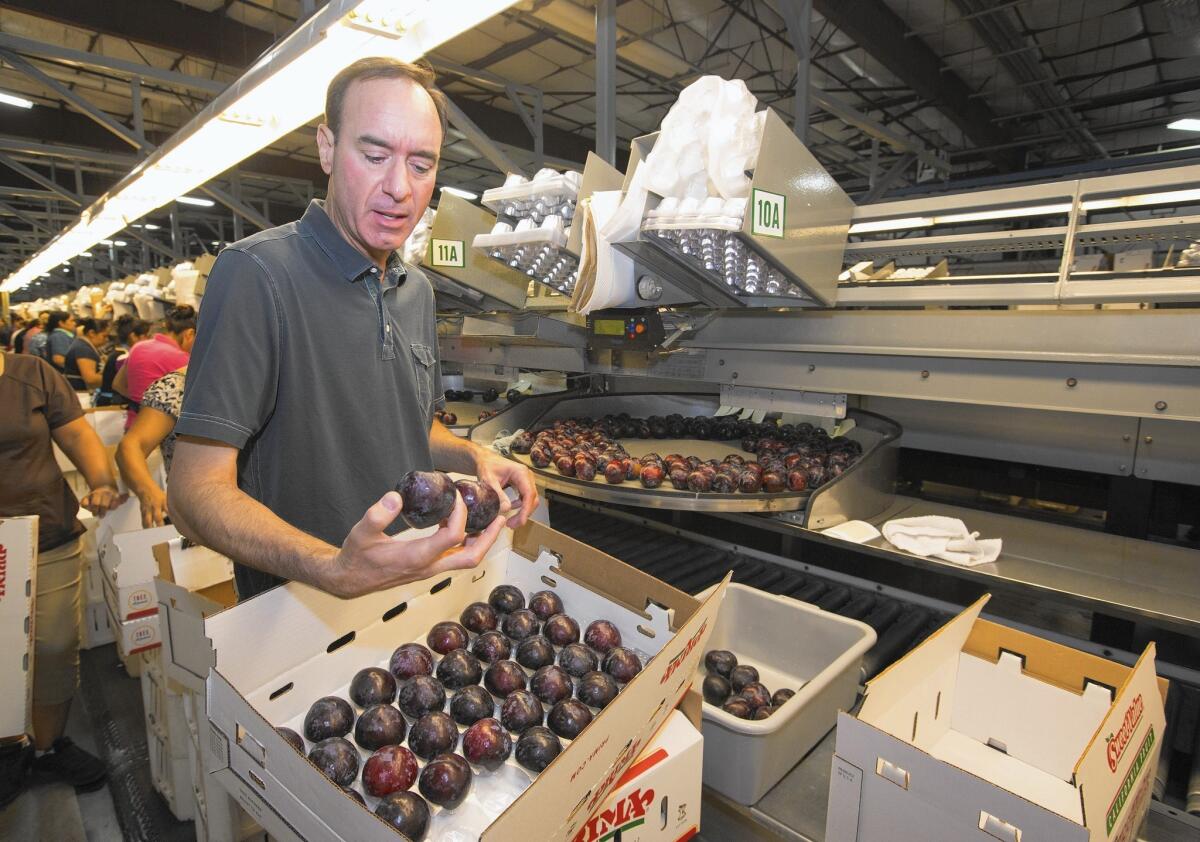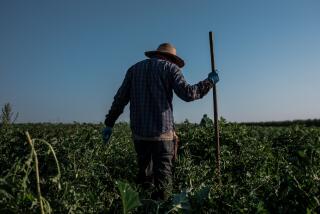Judge slams fruit grower over ‘bad faith’ bargaining with farmworkers

The state’s largest grower of peaches and other fruit bargained in bad faith with the United Farm Workers of America and wrongly tried to exclude as many as 1,500 employees from a collective bargaining agreement, a judge has ruled.
The decision gives a strong boost to the UFW’s claim to represent as many as 6,500 workers at Gerawan Farming Inc., a 12,000-acre farm and packing operation in the San Joaquin Valley that has been the focal point of one of the longest-running and most acrimonious labor dispute in decades.
The decision also reaffirms that employees of labor contractors, who now provide about half the workers who pick the state’s crops, are covered by union contracts signed with the grower.
The Gerawan-UFW fight, which began in the early 1990s, has sparked the single largest effort to decertify a union, along with a flurry of labor board and court decisions, including one that has stalled the state’s ability to impose a contract on warring parties.
And these parties have been at war, Administrative Law Judge William L. Schmidt acknowledged in a decision issued Friday.
Co-owner Dan Gerawan’s undisguised anger with the union, Schmidt wrote, “appears deep and unusually long-lasting,” and “perhaps explains the motive underlying the current expenditure of what must have been enormous sums by the Gerawan enterprises opposing the UFW and seeking to rid itself of any legal obligation to deal with that organization.”
Gerawan showed “at most, a lackadaisical attitude … and at worst, complete hostility” and “almost certainly guaranteed” a mediator would have to step in and impose a contract in 2013, Schmidt wrote.
Armando Elenes, a spokesman for the UFW, said the decision “confirms what we’ve been saying all along — Gerawan has been undermining the law. They’re trying to undermine the state of California.”
Gerawan’s lead attorney, David Schwarz, blasted the decision and promised an appeal — none of the previous decisions in the case has gone without appeals from the growers and the Agricultural Labor Relations Board.
“Gerawan is confident that these undemocratic decisions will not stand, and will challenge this latest erroneous ruling,” Schwarz said Monday. He accused the judge of blaming the grower for the union’s “unexplained, 17-year absence” from Gerawan’s fields.
Schmidt’s ruling appears to undermine Gerawan’s assertion that the union abandoned his workers in the mid-1990s before returning in 2012 to demand the right to negotiate a new contract. Gerawan has argued that UFW was solely looking to pad its membership and coffers — it collects dues of 3% of each member’s gross pay — by deliberately running out the clock on negotiations so it could obtain a contract imposed by a mediator.
Workers faced with those dues petitioned to hold an election to decertify the UFW — a stinging irony for the union founded by Cesar Chavez to obtain humane treatment of farmworkers. Union membership, once as high as 70,000, has fallen to just over 7,000.
Ballots from the 2013 decertification election never were counted, and last year the Agricultural Labor Relations Board — itself an outgrowth of Chavez’s labor movement — nullified the vote, saying Gerawan undermined the union by directly supporting an employee leading the ouster effort.
Schmidt ordered Gerawan to find and compensate employees for the eight-month period of bargaining impasse in 2013, and to allow officials from the Agricultural Labor Relations Board to enter his property to explain the decision and discuss rights with his current workforce — sessions that are to be paid for by Gerawan. The grower also will have to mail the decision to workers and post it at work sites for 60 days, Schmidt ruled.
The ALRB will issue a decision based on the judge’s opinion. That decision can be appealed.
Follow me: @LATgeoffmohan
More to Read
Inside the business of entertainment
The Wide Shot brings you news, analysis and insights on everything from streaming wars to production — and what it all means for the future.
You may occasionally receive promotional content from the Los Angeles Times.











